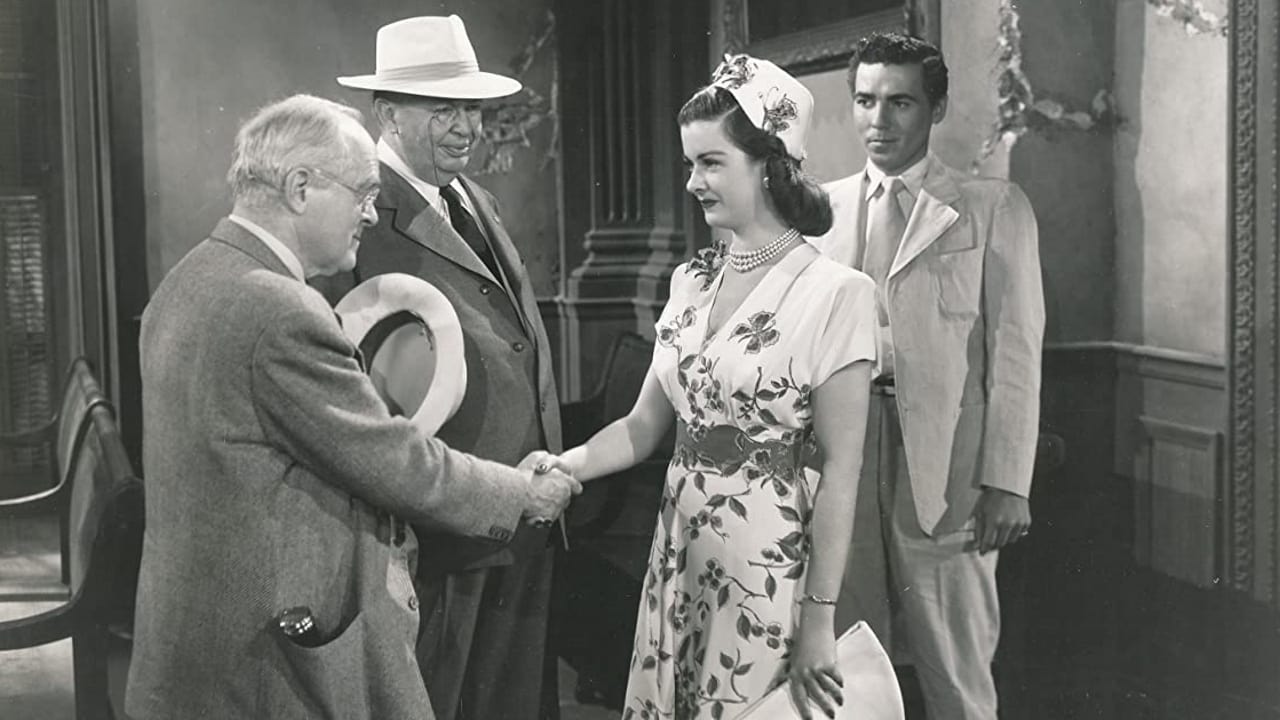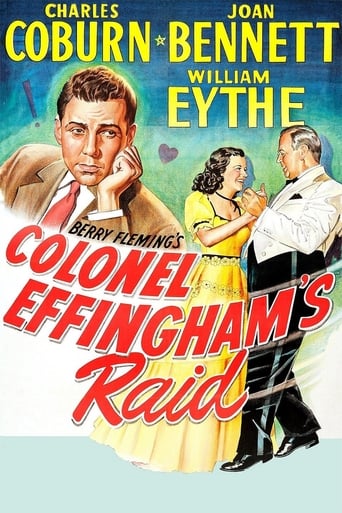



Instead, you get a movie that's enjoyable enough, but leaves you feeling like it could have been much, much more.
View MoreThere are moments that feel comical, some horrific, and some downright inspiring but the tonal shifts hardly matter as the end results come to a film that's perfect for this time.
View MoreClose shines in drama with strong language, adult themes.
View MoreThere's a more than satisfactory amount of boom-boom in the movie's trim running time.
View MoreAn Army colonel retires to his childhood home in 1940 Georgia in this 20th Century Fox film. Released in January 1946, this is one of the first films made after World War II. The war is just beginning in this story that's based on a novel by Berry Fleming. The story is about the colonel, Will Seaborn Effingham, played by Charles Coburn. It's seen through the eyes of his second cousin once removed, Albert Marbury (played by William Eythe). The setting is the fictitious town of Fredericksville, Georgia. Cousin Willie (the colonel) asks Albert about Fredericksville, and Albert says it's "just like any of a hundred towns in Georgia." The colonel asks, "What's the population now?" Albert says, "Oh, about 30,000." The colonel asks, "How many voted in the last election?" Albert answers, "Oh, four or five thousand, I'd say." The colonel then says, "You mean 25,000 took no part in the action?" I don't know if that was supposed to be part of the comedy – implying that the entire population of the town was of voting age. If not, it was a gaffe on the part of the screenplay. The latter may be the case, because the script for this film is weak. It seems disjointed and not well tied together. The comedy is very light, and it's even amateurish in places. In three scenes where Albert notices Ella Sue's legs (Joan Bennett), the film has a weird and clumsy whistle sound over. The colonel takes on the local pols when he writes a column for one of the two town's newspapers. Albert happens to work for it as a reporter. Ella Sue is the society editor. This could have been a very good film with a tight script and some crisp, fresh dialog and humor. But, it's a nap time film, mostly. The only reason to watch it is for Charles Coburn and Thurston Hall – one of the best early Hollywood character actors of bombast. He's the bloated mayor of the town. They are the only two who have worthwhile roles and seem to give them some effort.Eythe's Albert is mostly droll throughout. His part may have been written that way in the book. Whether or not, it comes across that way. He just comes to life in a closing scene. Joan Bennett's Ella Sue was well below her talent and abilities, and the rest of the cast are forgettable. See the Quotes section under this IMDb Web page on the movie for the few funny lines. My favorite line in the film is is one by the colonel: "A community's history is its family tree."
View MoreCoburn is Col. Effingham, recently retired from the U.S. Army and returned to the home town he left as a youth. It's 1940 and things have changed for the imperious old battle horse. He finds the "Home Folks Party", the mayor and his relatives, control everything in Fredericksville. They're corrupt and Coburn wangles a column in the local newspaper, stirring people to revolt against the changes introduced by the Home Folks Party. Why, they want to change the name of Confederate Memorial Square to Toolen Square, after some political bigwig.Let us make this as clear as the movie makes it. Charles Coburn is fighting to bring a halt to social change and bring back the venerable Confederate values of General Lee. They survived Sherman's march and they kicked out Reconstruction. Working women are scoffed at. The African-American "orderly" is given orders and happily marches around to a drum beat, when he's not being humiliated in swordplay with the colonel. (He's happy, though, except when cowering in fear.) It's kind of instructive though. The Home Folks party agrees to keep the name of Confederate Memorial Square and even beautify it with trees. At the same time they'll replace the 180 year old court house with a new one, meaning a work contract for the mayor's brother-in-law. We see the same dynamic at work in today's Congress. They attach "riders" to important legislation. The bill winds up looking like this: "We agree to continue funding the United States Armed Forces. PS: We will change the name of Fort Hancock to Fort Armistad." The battles continue between Coburn and his increasing number of supporters on the one hand, and the Home Folks party and its mayor on the other. The immortal Bess Flowers appears as a party guest. As the tale grows more serious, you'll find yourself rooting for Colonel Effingham and his "troops". The ending is a Capraesque caper.In the end, despite all the echoes of the Confederacy, I don't really see this as a message that the South was, and should continue to be, a paragon of old-fashioned virtue. The story could have taken place anywhere that had a bit of regional identity. Instead of the Confederate Memorial Square, it might have been the statue of the Minuteman at Concord. Instead of a community fight over tearing down the old courthouse, it might have been a disagreement over getting rid of Plymouth Rock and replacing it with a shopping mall owned by the mayor's brother-in-law.More important, it's an inoculation in 1940 for the coming war, just a taste of it, to get the adrenal medullas into shape. The narrator, a handsome young newspaper man, joins the Georgia National Guard and is introduced to a water-cooled Browning .30 caliber machine gun. There is a discussion about Fredericksville not being isolated from events in Europe, which are periodically alluded to. Colonel Effingham represents the practically, the adherence to tradition, and the élan of the military. He stirs things up. "Why did he have to come back here," moans the narrator, "when we were so peaceful and contented.""Colonel Effingham's Raid" was from a novel written by Georgian Barry Fleming and published in 1943. I imagine it was begun a year or two earlier, when the war had just begun or even maybe before Pearl Harbor, when isolationist sentiment was strong. Fleming was no retrograde pinhead. He'd been graduated from Harvard, spent some years in France, lived in New York, and his work was acclaimed by such respectable sources as the New York Times.
View MoreThe main reason I saw this film is that it starred the wonderful character actor, Charles Coburn. Well, in this sense, I wasn't disappointed as once again Coburn played the sort of crotchety but lovable guy he so often played in films. However, sadly the film seemed like it was very strongly inspired by MR. SMITH GOES TO WASHINGTON (so it loses points for originality) and it unfortunately ended way too abruptly--like they knew it was supposed to be a B-picture so they ended it because this format wouldn't allow for a longer film! The film begins with the Colonel (Coburn) retiring to his childhood home in Georgia. Instead of just sitting back in a rocking chair, however, he wants to do a newspaper column to keep himself busy. At first, the column is very well received. However, when Coburn begins attacking the local corrupt administration, things start to get kind of crazy and soon it's this character and his new friends versus the establishment. This is all sort of a history lesson on politics and grassroots politics and when the mayor and his cronies dig in their heels for a fight the film gets interesting. Oddly, however, after setting up this great confrontation, it just seems to end! In the matter of just a couple minutes, everyone agrees to Coburn's demands and they all live happily ever after!! What a letdown at the end.Overall, a pleasant and entertaining film that is worth watching but could have been even better. Excellent characters but a limp finale make this more of a nice time-passer than anything else.
View MoreCharles Coburn is his usual wonderful self. He is in a hurry, as he says `at 65, you have to be in a hurry'.A charming and funny `surprise' film - the surprises are all the little points of humor, which keep occurring throughout the film usually as punctuations to the events. A `Greek chorus' comments on Joan Bennett's legs, a character continually passes out `repent' cards to characters, mostly the politicians, and look for the sleeping husband in the background of one scene. A little heavy on the Southern touches for our current politically correct times, but not too bad in this regard. The ending is a little abrupt, but all in all, a very enjoyable film.
View More